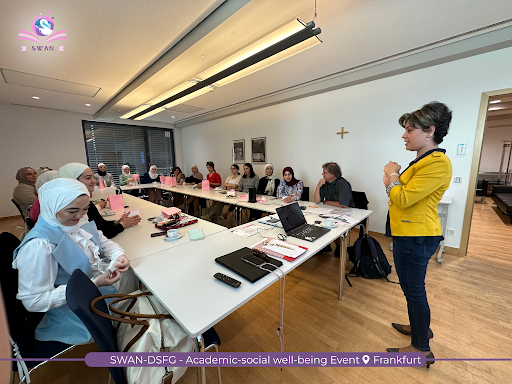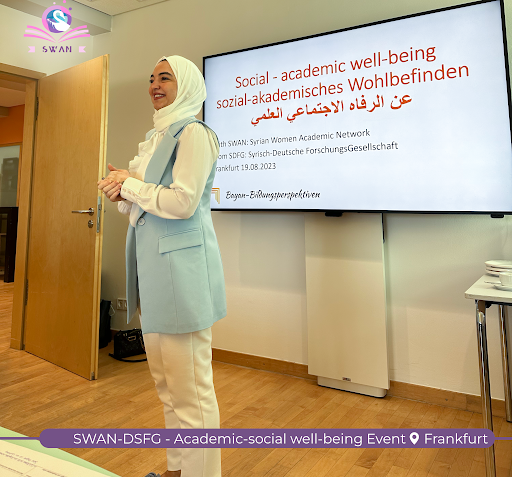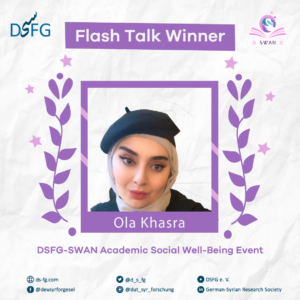Content List
Syrian Women's Academic Network (SWAN)
About The Network
It is an academic and social network that combines Syrian female researchers from various scientific and literary disciplines. They gather periodically for communication, dialogue, information exchange, and support, resembling a Syrian women’s academic cooperative to empower academic researchers.
The network addresses diverse topics, including challenges, issues, and risks in the academic field at both collective and individual levels. It explores weaknesses, critical subjects, and challenges of motherhood in achieving a balance with professional life, raising awareness of women’s roles in science, and bridging the gender gap in contemporary academic environments in general, and in Syria specifically.
Network Activities
Meet Odette
One of the main projects of the Syrian Women’s Academic Network at the Syrian-German Society for Scientific Research is “Meet Odette.” This project focuses on documenting inspiring stories of Syrian and Arab female researchers and academics through virtual interviews attended by network members. The interviews delve into their beginnings, struggles, and accomplishments.
The first “Meet Odette” session featured archaeologist Zina Awad, a native of Homs, whose passion for archaeology has been growing since childhood. She pursued her academic career by obtaining a Ph.D. from the Institute of Ancient Near Eastern Studies at Ludwig Maximilian University in Munich, Germany.
The two-hour session provided attendees with insights into her research on the “patron deities” and their development since the second millennium BC. Additionally, Zina Awad shared her experience in scientific research and emphasized the importance of mental health during this journey.
PENs Jour Fixe Regular Meeting
The Syrian Women’s Academic Network embraces openness to experiences within a framework of diversity and continuity. It comprises 138 female academic researchers of Syrian origin working in various countries such as Jordan, Lebanon, Iraq, Egypt, the United Arab Emirates, France, Italy, Sweden, the Netherlands, Britain, Canada, Hungary, Turkey, and Slovakia.
The first meeting was titled "Nice that you are here" or "Glad that you are here" (Shön, dass du da bist)
aiming to launch the SWAN project by introducing its purpose, stages, goals, and vision. The discussion outlined the broad lines of work for sustaining and developing the network to provide maximum support for Syrian female researchers. The network’s name (SWAN) and the designation of its members as (PENs) were explained, resulting in many distinctive and engaging responses.
Each network member introduced herself academically and professionally, filling the session with inspirational stories about their research and social experiences related to scientific research.
In conclusion, the researchers expressed gratitude for the existence of a supportive project for female researchers, creating an environment aligned with their interests and directions, and fostering networking and fruitful communication.
Second Meeting: "My powers are ordinary, Only my application brings me success"
In this meeting, SWAN members shared their experiences in submitting applications for specific academic opportunities and the challenges they faced. The focus was on the key to success in the application process, emphasizing that failure does not mean the end or surrender.
Five different stories from five members were presented, with each member speaking for 10 minutes. The session allowed for questions and answers, providing motivational responses and support. The discussions motivated other researchers to continue their academic journey and apply for significant international opportunities without losing hope.
The meeting also showcased examples of applications for doctoral positions in fields such as medicine, literature, and humanities in Germany. Additionally, it covered applications for the European Erasmus scholarship to pursue a master’s degree in biology and applications for postgraduate studies in the medical field in the United States. The session included advice on making applications successful, overcoming obstacles, and how to handle challenging situations.
Third Meeting: "To learn a language is to have one more window from which to look at the world"
During this meeting, researchers shared their stories of learning new languages, whether to achieve a specific goal, such as obtaining a university specialization or a scholarship, or simply as a passion for learning multiple languages. They discussed available methods for language learning, mastering the language through easy tools used in daily life.
One member, Nour, shared her experience learning English through studying English literature. She provided tips for practicing the language through teaching, reading, frequent listening, and writing daily events in English. The session emphasized that learning a language is an acquired skill that requires patience and significant effort.
The meeting focused on challenges and difficulties, presenting experiences from various academic fields and geographical distributions. Learning a language is a cumulative experience that demands patience and effort. The dialogue between participants created a motivating atmosphere when discussing the opportunities provided by the new language, serving as a strong incentive for participants to continue their journey of learning a new language. Participants also stressed the importance of preserving their native language and dealing with bullying incidents that individuals may face during the process of learning a new language.
Fourth Meeting: "If they don't like you for being yourself, be yourself even more"
During the fourth meeting, researchers shared stories of academic bullying and its impact on their academic development. They discussed the challenges they faced in their work and shared experiences in dealing with these challenges.
Ghazal, a member of the network, talked about her experience with bullying during her pharmacy studies in Germany. She shared how she dealt with bullying and her ability to maintain emotional stability in the face of such situations. Another member, Mayada, affirmed Ghazal’s words and discussed how she faced various challenges, such as sectarian bullying, during her work.
Workshop on Academic and Social Well-being in Frankfurt
The Syrian Women’s Academic Network organized an event aimed at empowering Syrian female researchers in Germany to achieve a balance between academic and social aspects. Female academic researchers, especially those who are foreigners, face various challenges on multiple levels.
Mrs. Bayan Adnan, a master’s degree student in Educational Sciences at Carl von Ossietzky University in Oldenburg, who focused on the topic of migration and education, and a lecturer in social work at the International University of Bremen, recounted the day’s activities. The event, attended by 25 participants, covered energy management, emotion regulation, time management, integration, and conflict resolution using diverse methods and exercises. The workshop emphasized activating communication among Syrian female academics in Germany, supporting them in identifying and utilizing their strengths, and improving their personal, social, and academic skills.
After conducting a feedback survey, the Syrian Women’s Academic Network received the following results:
- Building connections to strengthen communication in our native language:
One participant expressed, “I liked the spontaneous way of communicating and understanding among us.” Another participant stated, “I have been in Germany for a year and a half, and for the first time, I feel a sense of belonging. It feels like home. I felt a connection with the other girls, and the same goes for the workshop details; it felt like I was at home.”
- Motivation and support to boost the spirits of Syrian women:
In a climate of presence and integration among the attendees, positive emotions were shared among them. One participant stated, “The most striking point for me as a Syrian girl is that at first glance, we seem different, but in reality, we were open to each other in various fields and academic degrees. This made me very happy.”
- Inspirational Syrian women proving their effectiveness within the German community:
Living in a Western society with a different culture is not easy, but being part of this society and interacting with those who make you feel safe, close, and inspired is truly wonderful. One of SWAN’s goals is to encourage the creation of a community of Syrian female academics, and this is something the network has been successful in achieving. One woman highlighted, “For a while, I wished – as an Arab girl living in European society – for the existence of a community, organization, or network like SWAN, supporting Arab academics and resembling institutions in Western countries. I am proud of the concept and vision embraced by the network compared to other networks.”
The event, funded by the CITOYEN Foundation, received positive feedback from participants. The survey results highlighted the importance of networking in maintaining connections with the Arabic language, motivation, and support for Syrian women in academia, and the establishment of a community for Syrian female academics in the West.



The event featured a SWAN Flash Talk, shedding light on the inspiring stories of five participants in Germany. The award for the most inspiring story went to Ola Khasra, recognizing her journey in pursuing her dream of studying human medicine, and overcoming academic and personal challenges, particularly the impact of the war in Syria.
Ola, supported by her mother, documented her story upon arrival in Germany, engaging in community activities and eventually becoming a city council member. She actively sought opportunities for professional training, volunteering, and attending educational courses to enhance her position in German society.
Ola’s story serves as an example of determination, optimism, and continuous personal development, symbolizing the strength of Syrian women in pursuing their dreams in a new country.
The event was sponsored by the CITOYEN Foundation, aiming to promote public spirit and civic participation in the Rhine and Main regions.

Members' Testimonies
The testimonials from SWAN members reflect the positive impact of the network meetings.
Bushra Youssef described the first meeting as a powerful journey, instilling in her the willpower and belief in the importance of knowledge and the role of Syrian female researchers.

Nahed Abdul Jalil expressed that the second meeting was filled with hope, energy, strength, and support, providing answers to long-searched questions and exceeding her expectations.
Noor Tzka described the third meeting as a joyous experience, full of hope and empowerment by amazing Syrian girls.

About Membership
If you are an academic researcher or interested in scientific research, the Syrian Academic Women’s Network has created a nurturing and safe environment for you to connect with your peers in the academic and scientific fields!
Membership Conditions:
- Passion for Science and Scientific Research: Applicants should have a strong passion for learning and scientific exploration, regardless of their current academic qualifications.
- Experiences, Not Age: The focus is on experiences and contributions in the academic and research fields rather than age.
- Collaboration and Encouragement: Network members should be ready to collaborate, offer support and encouragement to each other, and exchange knowledge and experiences effectively.
- Excellence and Innovation: Members are encouraged to be creative and innovative in their fields, contributing unique value to the research and scientific community.
- Equality and Diversity: The association should be accessible to all Syrian female researchers, regardless of their backgrounds or locations. It respects and encourages cultural and academic diversity.
- Social Responsibility: Members should be willing to address social issues, participate in community development, and contribute to solving social problems through their academic fields.
- Effective Communication: Members should be capable of effective communication, both within the network and with the broader scientific community, disseminating their ideas and research effectively.
- Commitment to Association Goals: Members must be committed to the goals and vision of the association, with a genuine desire to achieve academic and research progress for Syrian female researchers.
To apply for membership in the Syrian Academic Women’s Network, please sign up here
If you have any questions, you can contact us directly through social media or the following email address:
